Jo Whiley: ‘Being on air at this moment has shown me how important radio is’
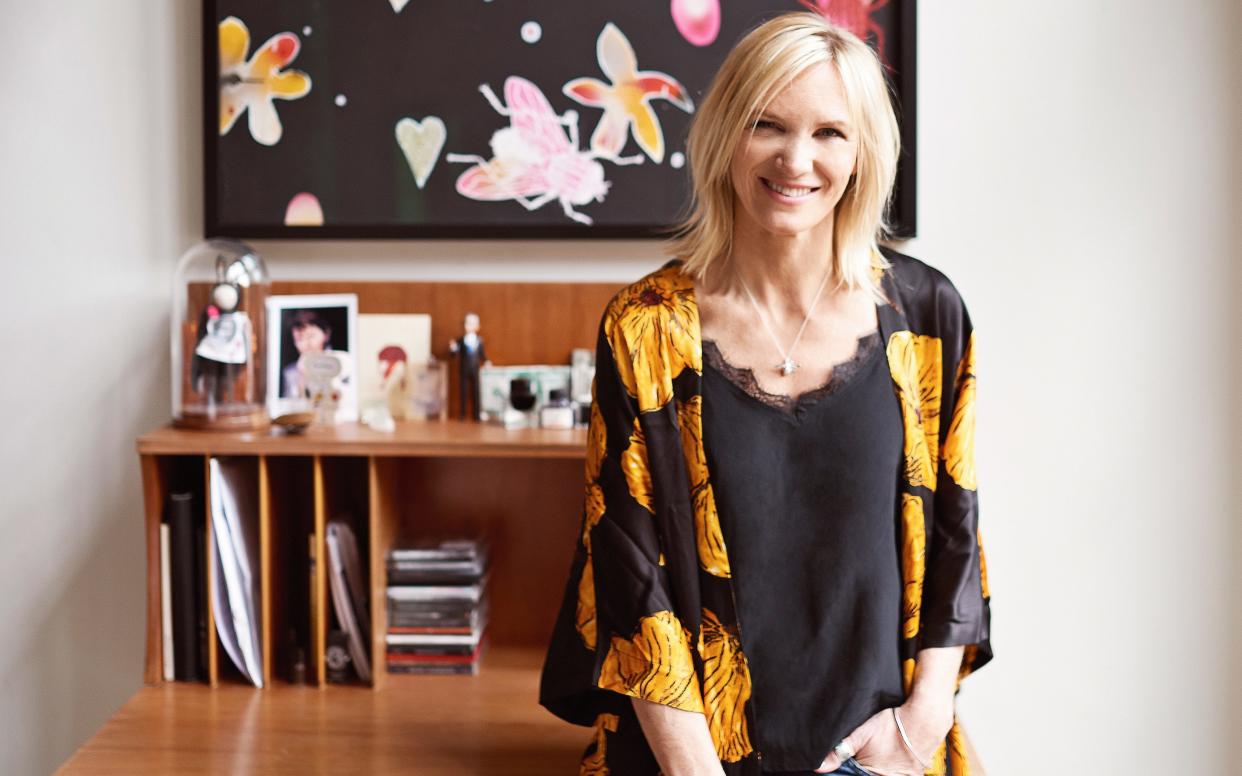

The wallpaper in Jo Whiley’s bedroom is bold. There’s a big black-and-white baroque print and I’m looking at it in silence for a few seconds before her tousled blonde bob appears on the video call.
‘I tweeted the other day, “Just to clarify, we’re not doing bras any more?”’ she laughs. ‘It was the most-liked Tweet I’ve ever posted. I’m quite enjoying being a complete slob and embracing leisurewear. I’m liberated. I like to be fit so I would always rather go to the gym than put make-up on, and I’ve never been a big one for wearing heels anyway.’
The esteemed BBC radio broadcaster and television host, 54, is locked down with her whole family – she managed to get all four of her children, aged between 11 and 28, back from their various universities and flat-shares to her converted-barn home in Northamptonshire.
‘When your kids leave home, normally the one thing you crave is to go to bed at night with them all together under your roof again,’ she explains. ‘Now I’ve got that constantly, which I love. However every time I go food shopping, it’s like Christmas. People in the supermarket must think I’m hoarding. The washing up is off the charts. We’ve got the four kids and various partners here as well, so the house is rammed.’
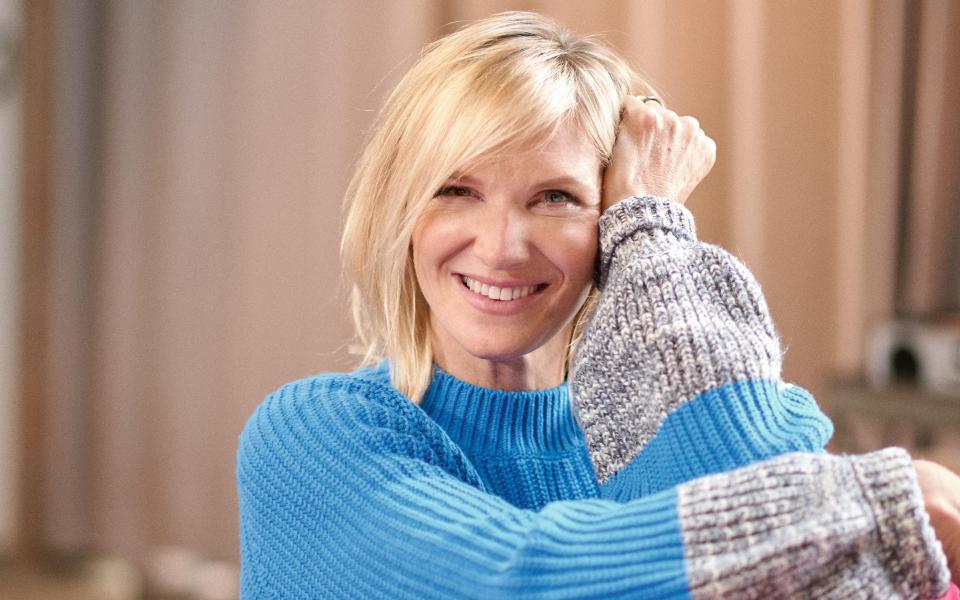
Jo says that it took a few days for the family to get used to their new lockdown rhythm. All of her children are at different stages of their lives – eldest India, for example, was working as a food stylist in London, while youngest Coco was approaching her final terms at primary school.
‘I was so worried about them all,’ Jo says. ‘My son Jude [21] is in his final year at uni, doing his dissertation. Then I’ve got Cass [19] in his first year of uni and he’s got a band together. Things were taking off for all of them. We had one night at the start [of lockdown] when everyone had panic attacks and sat together crying. Now, they’ve settled and accepted what’s going on. I’m really proud of how they’ve dealt with it.’
When Jo needs to escape, she has the radio. Every evening during the crisis, her husband, Steve Morton, a band manager, has driven her the hour’s journey to the deserted BBC2 studio in London to broadcast her 8-11pm slot with a minimal, socially-distanced production team. He waits outside in the car, then drives her home. ‘Doing a live radio show can be physically and mentally exhausting – lots of adrenaline – and I worry about falling asleep at the wheel,’ she explains. ‘Also, we get some time together just the two of us, and in these challenging times it has actually been nice to hang out.’
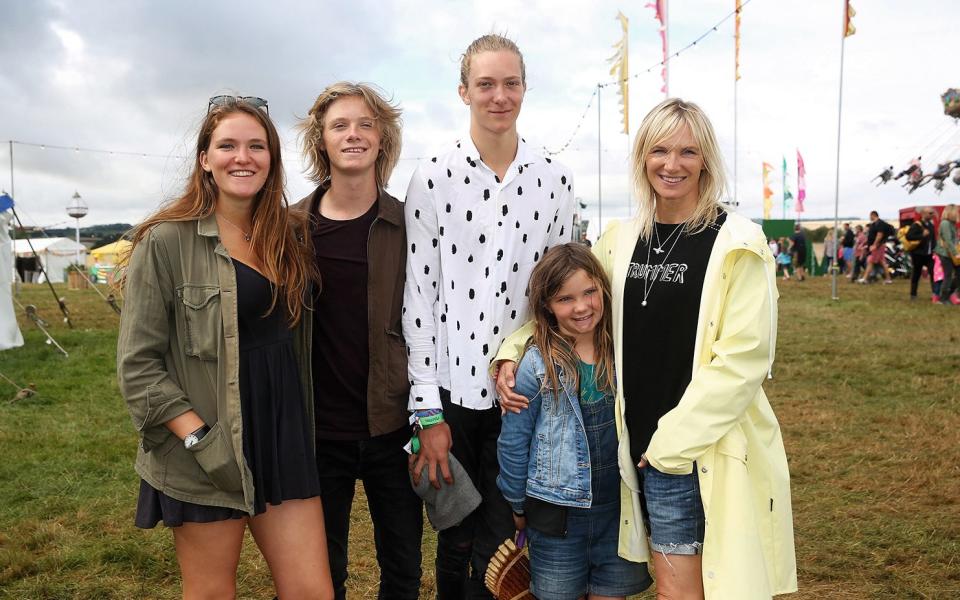
She recognises that for many, radio is a lifeline in lockdown. ‘We had a disabled lady who messaged the show who was alone in her flat, who said the show was the only thing that she was listening to and she felt connected. And one evening I played a song for a lady who was missing her daughter in Mozambique, then an hour later Dawn from Mozambique called to say, “I heard my mum on your show!”
‘The evenings can stretch ahead, and that’s when anxiety levels rise,’ she considers. ‘People don’t want to hear any more news at that time, they want to relax. My team and I work [over email] the day before to hand-pick every song: you want it to all work together and give people emotional songs, as well as feel-good songs that will make them dance around the kitchen.’
The pandemic, she says, has given her a sense of career clarity. ‘I love it more than I ever have,’ she says. ‘Being on air at this moment has shown me how important radio is. People always say, “What ambitions do you have, do you want to do this TV show, or have this slot…?” and now I’m like, no, this is it. John Peel – how content was he, and how pivotal in people’s lives? To be in a similar situation is all you can hope for as a broadcaster. I’ve found my home on Radio 2 in this slot, it suits my voice and the person I am.’
It has taken Jo more than three decades in the music industry to feel this way. She began her career in broadcasting straight out of university with stints at BBC Radio Sussex and Channel 4, before arriving at BBC Radio 1 in 1993, aged 28, where she presented the Evening Session with Steve Lamacq.
‘Radio was a male world,’ she remembers. ‘It was Annie Nightingale’s 80th birthday the other week. She is the reason I’m doing the job that I’m doing. When I started there was Annie, Janice Long, Jackie Brambles and Emma Freud. Very, very few women. I never really wanted to be perceived as a girl who was fighting to be on the radio, but by chance, that’s exactly what I was doing.’
Jo has been able to haul the whole family down to Glastonbury every year when she presents live for BBC One, essentially raising her children to adore music as much as she does. ‘They all love festivals,’ she nods ‘although I barely see them at Glastonbury, they all go off seeing the bands they like.’
She says that she has achieved all that she has professionally while raising a big family thanks to constant teamwork with Steve, her husband of 28 years. ‘I always had a desire to have a huge family. Steve and I both thrive on the chaos.’ By the time Coco was born in 2008, Jo was 42 and her career was soaring.
‘It’s worked because we juggle,’ she says matter-of-factly. ‘I’ve got an amazing family around me – my dad used to help look after the kids, which he still does to a certain degree. And Steve is always around. It can be hard when you’re not home very much – I missed out, particularly in the evenings when Coco was growing up, reading bedtime stories. You have this terrible ache when you tot up the hours that you’ve actually seen your kids and it can be panic-inducing. But that applies to anybody in any job. And I do what I do because I love what I do. [The kids] know the score.’
One of the most difficult periods of Jo’s career came in 2018 when Radio 2 assigned her co-presenting duties on its Drivetime show with the longstanding host, her friend Simon Mayo, in an attempt to address its gender imbalance on the airwaves. The decision was met with a backlash from listeners and Jo received a torrent of abuse online. The show ran from the May until December, when Mayo left the station and Jo returned to her evening slot.
‘It was one hell of a shock to discover this whole underworld, a cesspit of nastiness that goes on [with online commenters] that I was previously blissfully unaware of,’ she says. ‘I used to think, how could people actually live with themselves and enjoy being nasty? How do they justify the effect that they’ve had on a person? It was vicious.’
Now Jo can rattle off a list of female colleagues – and friends – working on primetime radio, whose work she rates. ‘It’s a fantastic time for women in radio,’ she smiles. ‘Lauren Laverne, Mary Anne Hobbs, Annie Mac, Claudia Winkleman… Zoë [Ball], Sara [Cox] and myself all emerged at around the same time. So to have Zoë doing a brilliant job on the breakfast show, then Sara is a burst of energy on Drivetime… It’s great that we are being taken seriously, being recognised as quality broadcasters.’
Jo has met David Bowie and Madonna; Jay-Z’s been round to the house. I ask if her kids think she’s cool. ‘I think they appreciate what I do – they got to meet Doctor Who, for goodness sake,’ she says. ‘There have been some amazing perks. But I’m still always the least cool member of the family.’
Kindness, she thinks, is an inherent personality trait for any Whiley. Jo’s father, Martin, was an electrician, while her mother, Christine, ran the post office at Althorp – the estate owned by Diana, Princess of Wales’s family, the Spencers – and served a young Lady Di many times. ‘My parents were the people who took people in the village to their doctors appointments, picking up old Mrs Mangle or whoever,’ she remembers. ‘They’ve always looked after others. I think my kids are very thoughtful because they’ve grown up with my sister, and my mother has shown them these amazing examples of kindness.’
A post shared by Jo Whiley (@jowhiley) on Apr 12, 2020 at 1:45pm PDT
Like many during this crisis, Jo has had to shop for another household in need. Her younger sister Frances, who has the rare syndrome cri du chat, a chromosomal condition with autism-like characteristics, usually lives in a Mencap care home – but for the duration of lockdown she has moved back in with their parents, who are in their 80s and live just a few miles away from Jo.
‘My sister lived with my parents up until five years ago,’ Jo explains. ‘She was sectioned, and we reached a breaking point where it became too difficult for her to live with Mum and Dad. She had been very happy at the care home – she’s on the autistic spectrum so she likes regularity. My dad was taking her to bingo every Thursday and she was staying with them every third weekend. Then all this happened…’
The Whileys were forced to decide whether to keep Frances in residential care, where she would struggle without her routine and regular contact with her parents, or bring her home. ‘For the first few days I felt sick with worry about how it would be,’ she says. ‘When Frances gets disturbed, her behaviour can be destructive. But she has been on her best behaviour, doing jigsaws, the works. Then my mum got ill and I thought she had the virus – she is the glue that keeps the family together. Without her, it would be hell. I knew if I called an ambulance for her it would set my sister off completely, she would be obsessed and thrown out for weeks.’
Jo’s mother, luckily, recovered quickly and was never diagnosed with coronavirus.

‘It’s so hard when you just want to make things better for your parents, make their bed and do their tidying up,’ she sighs. ‘You have to settle for dropping off the shopping and seeing them from the porch.’
Aside from hugging her parents and sister, having a swim at her favourite quarry (she’s been a passionate wild swimmer since her teens, with the lithe figure to prove it), and visiting the old ladies at her local coffee shop, the one thing on Jo’s personal must-do list for life after lockdown is to throw a huge party.
‘I love nothing more than a party,’ she grins. ‘We joke that our house is a commune: we have everyone round, with great music. When everyone went into isolation, the number of messages I got from my friends and my kids’ friends saying, “I wish we’d come to stay with you.” I wish they were all here too.’
With Glastonbury, her family’s favourite festival of the year and her own big annual career gig, cancelled, Jo has now made alternative plans for 24 June, too.
‘We’re going to do Glaston-Whiley,’ she says. ‘When the time comes, we’ll have our own festival at home. Everyone is going to be going at it 110 per cent.’ Let’s hope she can extend the invitation to us all on social media, too.
Jo Whiley is on BBC Radio 2 from 8pm-11pm, Monday to Thursday
The broadcasters keeping the nation going
By Fiona Cowood
Emma Barnett, Radio 5 Live: ‘There are days when I feel incredibly tearful’
‘I’m doing the show from a room in my house in south London. We’ve put cushions on the floor to help with the sound, and I hide away and do the show from there.
‘There’ve been some surreal moments, like recently when my team said, “Gordon Brown is on the line,” and I could hear my two-year-old son shouting “Mummy!” on the stairs, but we’ve got a really good system working now.
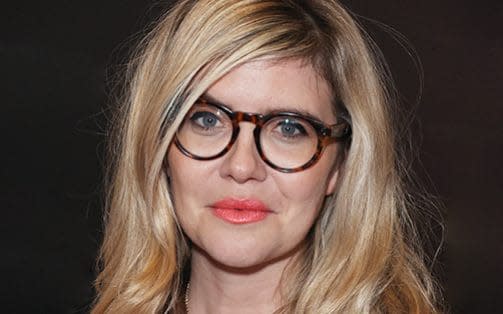
‘Coronavirus is affecting everyone in different ways – you’ve got to be so careful with your tone, and to not make assumptions about how everyone’s feeling. We’re a companion – we don’t want to lecture you or drone on at you.
‘We don’t actually talk much about the virus itself; instead we talk about what the measures taken to deal with it have done to society, and to our bank balances, jobs and sense of self. When you do talk to someone who’s been directly affected by it, reality suddenly cuts in. I’d be lying if I said there aren’t days when I feel incredibly tearful after a show.’
Emma is on BBC Radio 5 Live from 10am-1pm, Monday to Thursday
Zoë Ball, Radio 2: ‘I was star-struck speaking to Captain Tom Moore’
‘Our listeners have always sent in lots of shout-outs, but those messages feel even more important at the moment – most of them are from people missing loved ones, or for key workers on the frontline.
I’m still going into Wogan House, central London, to do the show but now I’m in the studio alone. Our show is all about trying to reflect the mood of the nation, allowing ourselves to be emotional at times – having a wobble and a cry – but then also trying to keep positive and cheer people up.

‘We had Captain Tom Moore on and I had to really dig deep to hold it together. I was way more star-struck speaking to him than any other superstar guest we’ve had on the breakfast show.
‘Luckily, spring arrived just when we needed it most. I’m spending a lot of time in my garden in Sussex. Every evening at 5pm, my partner Michael and I sit on the bench in the sunshine, have a cup of tea and watch the birds. We’re appreciating nature so much more.
‘I used to wish we had a 1950s style of life and now that’s happened. I don’t know if life will ever be quite the same again. I’m really hoping we keep this sense of community spirit. We’ve all stepped off the hamster wheel and hopefully this will slow us down, and we’ll appreciate everything we’ve taken for granted for so long.’
Zoë is on Radio 2, 6.30am-9.30am, Monday to Friday
Shelagh Fogarty, LBC: ‘I’m broadcasting from my childhood bedroom’
‘My mum is in her late 80s and lives alone, so two weeks before lockdown, I moved from London to Liverpool to look after her in place of her usual carers. I’m now broadcasting from my old bedroom – I’ve even got Donny Osmond and Starsky & Hutch posters back up on the wall.
‘For all the personal disruption of removing myself from my London life, it’s nothing compared to what so many people are going through. Every day I speak to a lot of people who are either very scared or completely alone. That means you really have to make every conversation count.

‘Recently, a woman rang in who’d been widowed by coronavirus and she was so matter-of-fact as she described this tragedy. She wasn’t getting any help and my gut was turning as I was speaking to her.
‘At LBC we’ve made a conscious decision to focus entirely on coronavirus. One day I’ll focus on Universal Credit, the next day will be schools, then domestic violence… That’s what makes this story different from anything else I’ve covered – it affects every single human issue.’
Shelagh is on LBC from 1pm-4pm, Monday to Friday
Cerys Matthews, Radio 6 Music: ‘There’s a palpable sense of connectivity’
‘I’m still going into the studio on Sundays to do my 6 Music show but the building is almost empty, so you’re very aware that we’re living in very different times.
‘Music takes on power in a situation like this so I’ve been double- and triple-checking the sense and emotions in the songs I’m choosing to play, aware that some tracks reference missing loved ones or losing someone. I’m also trying to fill the show with feel-good songs, to keep us going, and keep us strong and hopeful.
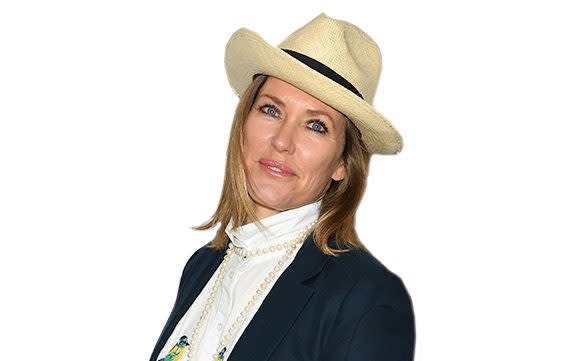
‘Despite the fact that we’re all mostly in our four walls, there’s a palpable sense of connectivity. On radio, we’re able to connect people not just across the UK but across the world. My mother, and a lot of my relatives, are on their own so I know that radio brings people company – that regularity, ritual and a friendly voice.
‘We’re all doing well at home; our only problem is that the internet isn’t strong enough so there’s perpetual fighting and shouts of, “Get off the internet!” especially now that school is sending work home.
‘I’m loving cooking every day and I’ve made playlists on Spotify of music from around the world. To listen to music from different cultures, while cooking, and knowing that we’re all going through the same thing, has been a real source of joy and comfort.’
Cerys is on Radio 6 Music from 11am-2pm, Sundays


